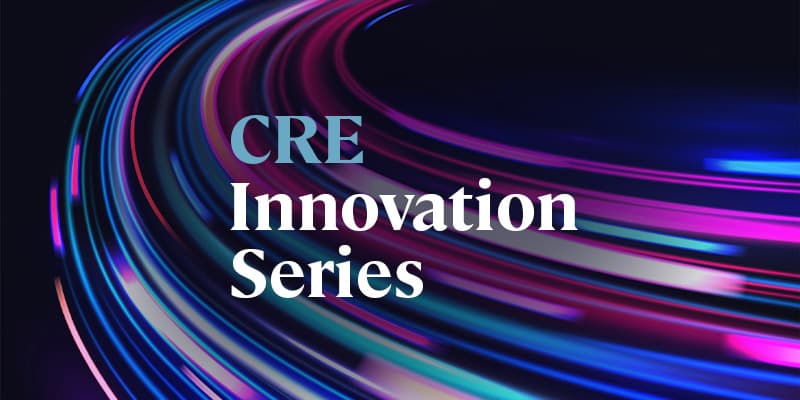Key highlights
Machine learning can already analyze vast quantities of data to help commercial real estate professionals make better decisions – but few companies are yet to make the leap into leveraging generative AI
As the adoption of Generative AI (GenAI) spreads across industries, its influence on the world of commercial real estate is undeniable – as is its future potential to transform key aspects of CRE businesses
Altus Group’s Omar Eltorai and Sally Johnstone share their views on what steps commercial real estate leaders can take today to prepare for the transformative power of GenAI
Generative AI’s breakout year
According to McKinsey, 2023 is the “breakout year” for generative artificial intelligence (GenAI) – the most recent in a long line of machine learning tools that began with Charles Babbage’s Analytical Engine.
More than three quarters (79%) of C-suite leaders, McKinsey says, have had some exposure to GenAI and 22% are using it regularly in their own work.
What’s more, 40% of business leaders are ramping up their investment in AI technologies across the board because of the recent advances in GenAI. Consequently, technology analyst Forrester predicts spending on AI will surpass US$64 billion by 2025 – a doubling in just four years.
Metaprop, the world's largest venture capital firm focused on property technology, expects the adoption of GenAI to “occur faster than cloud computing, and smartphone adoption and significantly impact every industry including real estate”.
Real estate decision making is famous for relying on “gut feel”. But that instinct is often the result of decades of experience, observes Altus Group’s Director of Research, Omar Eltorai. “People often can’t articulate all the inputs that went into their decision, but artificial intelligence and machine learning models are trying to replicate that.”
From lead generation to leasing, facility management to finance – every part of the real estate ecosystem is embracing AI tools to streamline workflows, make better decisions and carve out more time to deliver personalized and human-centered experiences.
Real estate is a “process-oriented” industry, Omar says. “Whether it is brokerage, leasing or facilities management, the CRE industry is filled with repeatable processes. And where there is a repeatable process, there is an opportunity to harness AI to work faster and smarter.”
The real estate ecosystem is made up of buildings, people and “massive amounts” of documentation, Omar adds. Managing and making sense of this documentation – in its inconsistent formats and templates – is time consuming. But GenAI can extract and analyze unstructured data from complex leases, appraisals and loan documents, as well as from PDFs of floorplans and designs. Australian real estate company Investa, for instance, has developed a “tenant brief extractor” which trained GenAI on hundreds of de-identified tenant briefs to understand where the office leasing market is moving.
“GenAI’s long term impact on the CRE industry may likely be condensed timelines and efficiencies seen at both the individual firm- and industry-level,” Omar says.
Unleashing minds from the mundane
While OpenAI’s ChatGPT has captured most headlines and headspace in 2023, image generating tools like Midjourney and DALL-E have also taken the world by storm. In fact, some industry insiders suggest these tools can deliver a five-fold increase in architect productivity.
In an interview earlier this year, London-based architect Arthur Mamou-Mani, who specializes in digital design and fabrication, demonstrated the transformational potential. “Usually when you’re an architect, you have an idea, you sketch, you go on [the CAD software], you start modelling it, you tweak it, then you have to render it,” Mamou-Mani explained. With GenAI, “you have an idea, you start typing some words, and boom, you get the final renderings. The immediacy of the results versus the idea has never been that quick, which means you can iterate extremely fast”.
The results aren’t just fast – they also eliminate the need for some skills that are at the foundation of professions. McKinsey predicts that up to 70% of time-consuming tasks could be automated by 2045, delivering a 25% productivity boost. Goldman Sachs thinks 300 million full-time jobs are exposed. Will this be a threat to jobs? “Not adopting GenAI is a threat to jobs,” Omar suggests, “as history has shown that those who are able to leverage available technology the best tend to outperform.”
Sally Johnstone, Altus Group’s Senior Manager for Altus Market Insights Delivery, manages the team that serves as “interpreter” of data science output for clients. When asked what excites her most about the possible applications of Generative AI, she cites the ability to “know more and explore more, faster” – but with a couple of caveats. “AI can cast a wide net to analyze an almost endless number of scenarios. But large language models are trained on existing data; AI systems excel at pattern recognition and can generate content that is innovative within the scope of that training data, but a flash of creativity or an insight into the future isn’t going to come out of ChatGPT. Generative AI can free us from a lot of mundane processes like writing emails, summarizing meeting notes, responding to support questions, writing code snippets to leave room for more transformative thinking right now,” Sally says.
“In the future, AI could be trained to make decisions for us, like whether or not to acquire an asset, consider a new market, and the best portfolio allocation for optimal returns. That frees our time and mental bandwidth to dream and imagine the next built environment.”
Harnessing AI’s human advantage
Where exactly is GenAI headed? The truth is no one knows. Facebook was once a compilation of photos on a website for Harvard students, Sally notes. “Now think about how Facebook influences markets and elections.” With that in mind, what can commercial real estate professionals start doing today?
Experiment with the possibilities
To understand the suite of GenAI tools at our disposal, we must get into the sandbox and start playing with the technology. Learn how the tools work and what they can do, Omar suggests. “The first question to ask is: ‘Where can we deploy this now to enhance efficiency?’” But efficiency gains are just the beginning. By opening our minds to the power of GenAI, we can realize the opportunities that others may not see.
Understand the limitations
In their current form, GenAI programs “give you a C or maybe a B-minus answer – but they do it very fast,” Omar notes. “Investment analysis that once took a team of people might now take one. But the information gathered must still be presented to the investment committee and humans will make the ultimate decisions.” Omar points to the evolution of aviation as a useful analogy. “Think about flying. Planes are on autopilot for a lot of the route, but there are still human pilots in charge. I see the future of GenAI in the same way. It’s another tool that will help humans be more efficient,” Omar says.
Assess the risks
Experimentation helps to build confidence in using GenAI tools and trust in its capabilities. But teams must integrate GenAI into their process with “eyes wide open” to the inherent biases in every system, Sally warns. AI models can “hallucinate” inaccurate or outright incorrect answers, as Google’s chatbot famously did at its launch. All companies must carefully consider the implications of intellectual property infringement, identity theft, social engineering, security threats, prejudice and more.
According to Omar, leaders must also weigh the risks that come from being late to the GenAI party. “Creative disruption is at play, and the player with the advantage will eat or defeat the competition.” Some areas – software development, entertainment, professional and financial services, and education – are what Harvard Business Review calls “in the crucible” because competitors who adopt GenAI rapidly “will be better, faster, and cheaper”. As Sally says: “Nobody pats you on the back if you use a calculator to do complicated math. At what point will not using GenAI be the equivalent of refusing to use a calculator?”
Following his historic defeat by IBM’s Deep Blue computer in 1997, chess grandmaster Garry Kasparov warned the world: “Everything we know how to do, machines will do better”. But Altus Group’s team disagrees. “GenAI will change the way we work, and many mundane tasks will disappear,” Sally says. “But this will create space for us to do what we do best – create, collaborate and ultimately connect with other humans.”
Authors

Omar Eltorai
Director of Research

Sally Johnstone
Senior Manager, Offer Delivery
Authors

Omar Eltorai
Director of Research

Sally Johnstone
Senior Manager, Offer Delivery
Resources
Latest insights







